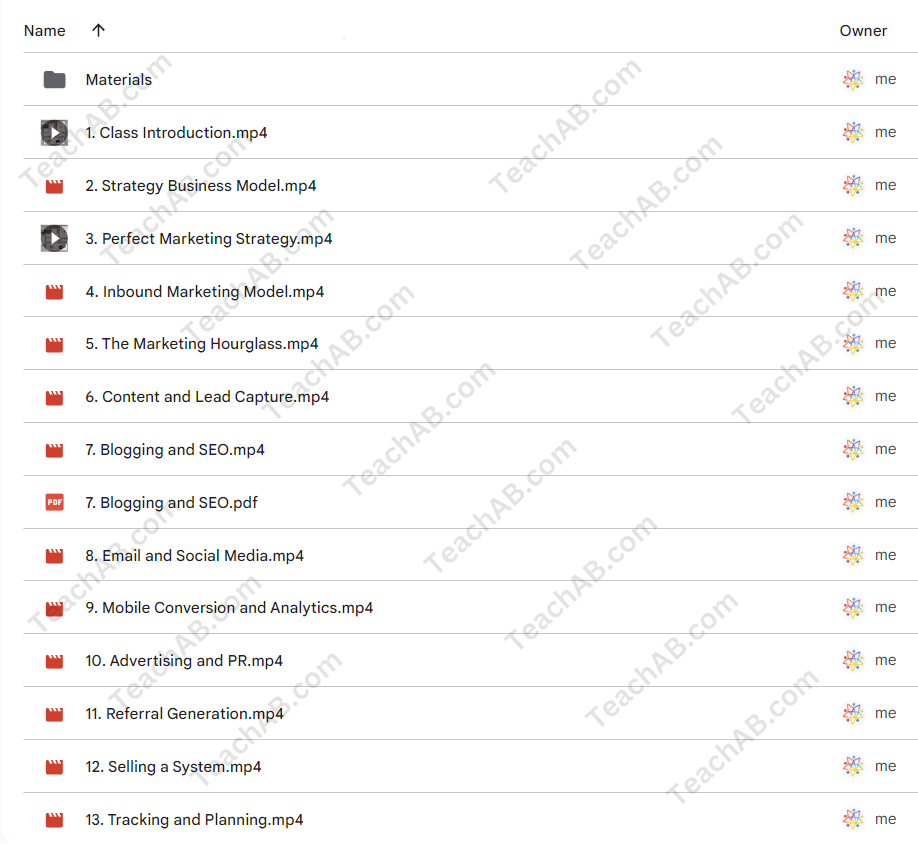Duct Tape Marketing By John Jantsch
$49.00 $5.00
Duct Tape Marketing By John Jantsch – Digital Download!
Content Proof:
Duct tape marketing: The world’s most practical small business marketing guide
In today’s bustling economy, small businesses often find themselves grappling with the challenge of carving out a niche in a saturated market. John Jantsch’s Duct Tape Marketing: The World’s Most Practical Small Business Marketing Guide offers a beacon of hope for these entrepreneurs. Unlike many marketing publications that drown readers in complex theories and jargon, Jantsch delivers a straightforward, actionable guide rooted in real-world experience. His practical approach not only demystifies marketing concepts but also empowers small business owners to execute effective strategies that resonate with their target audience. Through a blend of practical advice, relatable examples, and an emphasis on building meaningful customer relationships, Jantsch provides a roadmap that can lead small businesses to marketing success without the overwhelming burden of theoretical overload.
The foundational principles of sticky marketing
Building relationships in marketing
At the heart of Jantsch’s marketing philosophy lies what he calls “sticky marketing.” This approach underscores the importance of creating deep, lasting relationships with customers. Jantsch posits that for a business to thrive, clients need to know, like, and trust the brand. This principle serves as the primary pillar upon which successful marketing is built. Unlike traditional marketing methods, which often focus on hard-selling and aggressive tactics, sticky marketing encourages business owners to engage and connect with their audience genuinely.
This relationship-focused marketing strategy can be visualized as a woven tapestry. Each thread represents different components of customer interaction communication, trust, and value. When these threads are intertwined, they form a strong and resilient fabric that can withstand the wear and tear of commercial competition. Jantsch highlights that businesses are not just selling products or services; they are offering experiences that can foster loyalty.
Integration of marketing into business activities
Furthermore, Jantsch advocates for the integration of marketing into every aspect of business operations. This holistic approach, which he details through practical guidelines, asserts that marketing should not be an isolated activity occurring at designated times, but rather a continuous thread woven through all business activities. By aligning marketing strategies with overall business goals, owners can create a synchronized operation that responds effectively to market dynamics.
Imagine a well-oiled machine where each cog contributes harmoniously to the overall function. This analogy reflects the effectiveness of a cohesive marketing system. When marketing efforts are aligned with product development, customer service, and sales, business owners can create a seamless experience for their clients. This integration fosters not just customer retention but also encourages the word-of-mouth marketing that is invaluable for small enterprises.
Actionable takeaways for small business owners
Practicality over theory
One of the standout features of Jantsch’s guide is its emphasis on actionable takeaways. Recognizing that many small business owners have limited time and resources, he includes practical steps at the end of each chapter, enabling immediate application of the concepts discussed. This structure not only serves to reinforce the material but also makes the book a valuable resource for those seeking quick actionable strategies.
Key actionable takeaways from the book include:
- Identify Your Ideal Client: Understanding who you serve is paramount. Jantsch emphasizes the importance of defining the target audience clearly to tailor marketing messages effectively.
- Create a Compelling Value Proposition: Articulating what sets your business apart allows you to attract clients who resonate with your mission.
- Establish a Marketing Calendar: Planning marketing efforts over time ensures consistency and allows businesses to adapt and respond to market changes effectively.
- Leverage Customer Feedback: Engaging with customers post-purchase can provide invaluable insights that inform future marketing strategies.
By presenting the material in this practical manner, Jantsch speaks directly to the needs of small businesses. This accessibility transforms theoretical discussions into real-world applications, making it possible for entrepreneurs to see immediate results.
Immediate results for resource-limited businesses
The emphasis on practicality is particularly critical for small business owners who need immediate results from their marketing efforts. Unlike larger corporations that can afford to experiment and wait for long-term outcomes, small businesses often rely on quick wins to sustain their operations. Jantsch’s actionable steps provide a foundation for this immediate response, helping entrepreneurs navigate the complexities of marketing without feeling overwhelmed.
Consider a local bakery struggling to gain traction in a competitive area. By following Jantsch’s advice to identify their ideal client and create an engaging value proposition, the bakery can effectively target its marketing efforts, leading to increased foot traffic and customer loyalty. The ability to see tangible results is not just motivating but essential for the survival of small enterprises.
Understanding what customers value
The role of value creation
An integral part of Jantsch’s message is the notion that value creation is central to successful marketing. This principle transcends traditional marketing notions of pitching products based on features and benefits; instead, it focuses on understanding what customers genuinely value and how to communicate that effectively. Jantsch illustrates that identifying customer values can significantly influence marketing strategies, ensuring that offerings resonate with the audience.
By positioning products or services within the context of customer values, businesses can create compelling narratives that capture attention and drive action. Jantsch refers to the importance of empathy in marketing, urging business owners to view their operations through the eyes of their clients.
Relatable examples from real businesses
To drive home these points, Jantsch provides numerous examples from real-life businesses navigating similar challenges. For instance, a tech startup that revolutionized its marketing by focusing on user experience rather than just the features of its software. This shift allowed them to connect with their audience on a deeper level, ultimately leading to expanded market reach and customer loyalty.
Additionally, Jantsch advises business owners to engage in constant market research understanding trends and shifts in consumer behavior can unveil insights that drive product development and marketing strategies. By staying agile and responsive to client needs, small businesses reinforce their commitment to creating value, thereby solidifying their brand’s reputation.
Addressing modern marketing challenges
Adapting to evolving trends
While Duct Tape Marketing has received praise for its straightforward advice, some readers have noted areas where sections appear dated particularly concerning digital marketing trends. The landscape of marketing continues to evolve rapidly, influenced by technological advancements and changing consumer behaviors. Therefore, recognizing the relevance of Jantsch’s foundational principles is coupled with the need for adaptation in modern markets.
It is essential for business owners to not only digest the wisdom shared in Jantsch’s guide but also be willing to adapt these insights to a contemporary context. This may involve integrating social media strategies, embracing digital marketing tools, or leveraging online platforms to reach a broader audience.
The importance of flexibility
Flexibility in marketing strategies is imperative for success in today’s world. As industries shift and consumer preferences evolve, small business owners should continuously evaluate their approaches and pivot when necessary. Jantsch’s framework provides a solid foundation from which adaptations can be made. His approach ensures that the core principles of relationship-building and value creation persist, even as marketing channels change.
Therefore, while Jantsch’s timeless principles are invaluable, they must be viewed as a starting point for a marketing strategy that is dynamic and responsive. Small businesses must not only draw upon Jantsch’s insights but also actively seek out current trends, technologies, and tactics to remain competitive.
Conclusion
In a world where small businesses face increasing competition and rapidly changing consumer preferences, Duct Tape Marketing: The World’s Most Practical Small Business Marketing Guide by John Jantsch stands as a crucial resource. The emphasis on practical, actionable strategies woven into the fabric of relationship-focused marketing encourages entrepreneurs to engage deeply with their audience. While acknowledging the need for adaptability to modern marketing trends, the core principles outlined by Jantsch equip small business owners with the tools necessary to carve out their space in the marketplace. By focusing on value creation and the importance of sticky marketing, Jantsch presents a blueprint for small businesses to navigate the complexities of marketing with confidence and clarity. Whether you are just starting or looking to revamp your existing strategies, Jantsch’s guide offers insightful, practical solutions that can propel your business toward success.
Frequently Asked Questions:
Business Model Innovation: We use a group buying approach that enables users to split expenses and get discounted access to well-liked courses.
Despite worries regarding distribution strategies from content creators, this strategy helps people with low incomes.
Legal Aspects to Take into Account: Our operations’ legality entails several intricate considerations.
There are no explicit resale restrictions mentioned at the time of purchase, even though we do not have the course developers’ express consent to redistribute their content.
This uncertainty gives us the chance to offer reasonably priced instructional materials.
Quality Assurance: We guarantee that every course resource you buy is exactly the same as what the authors themselves are offering.
It’s crucial to realize, nevertheless, that we are not authorized suppliers. Therefore, the following are not included in our offerings:
– Live coaching sessions or calls with the course author.
– Entry to groups or portals that are only available to authors.
– Participation in closed forums.
– Straightforward email assistance from the writer or their group.
Our goal is to lower the barrier to education by providing these courses on our own, without the official channels’ premium services. We value your comprehension of our distinct methodology.
Be the first to review “Duct Tape Marketing By John Jantsch” Cancel reply
You must be logged in to post a review.



















Reviews
There are no reviews yet.